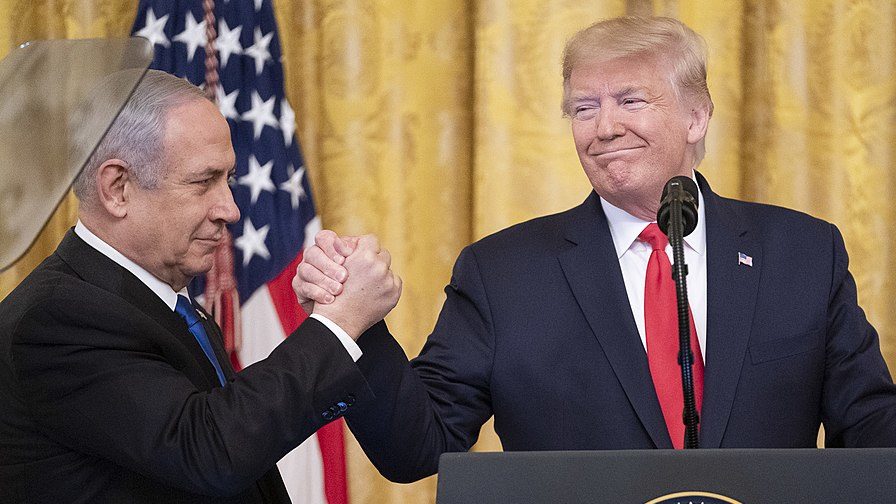The International Community versus Israel on Annexation
An analysis of potential fallout from the prospective application of Israeli sovereignty over parts of the West Bank
Prime Minister Binyamin Netanyahu this week told fellow Likud lawmakers that a date has been set in July when Israel will annex parts of the West Bank in accordance with US President Donald Trump’s Middle East peace plan.
The prospective move has drawn the ire of much of the international community, with condemnations emanating from across the globe. But a deeper analysis suggests that some countries ostensibly rejecting the application of Israeli sovereignty over Palestinian-claimed territories are merely paying lip service to Ramallah.
European Union officials have been most vociferous in their opposition, with Brussels threatening to sanction the Jewish state if it presses on. Earlier this month, the 27-nation bloc’s foreign policy chief, Josep Borrell, warned that Israel’s actions would not go “unchallenged.”
Borrell convened a meeting of high-ranking diplomats to discuss a possible response. But to his dismay, the gathering, more than anything else, made clear that there is a lack of consensus among EU member states.
He then took the unusual step of issuing his own statement, reiterating a commitment in the name of the entire EU – which, as the meeting showed, is patently false – to create an “independent, democratic, contiguous [and] sovereign” Palestinian state on the basis of the pre-1967 borders.
Borrell also suggested that the Trump Administration’s peace initiative departed from “internationally agreed parameters.” In turn, a spokeswoman for Israel’s Foreign Ministry denounced his “threatening language” and noted that Brussels risked becoming a “minimized” regional actor.
Jonathan Sacerdoti, a London-based political analyst, notes that the EU views the Palestinians solely as an aggrieved party.

Jonathan Sacerdoti (Twitter)
“The EU believes that the application of Israeli sovereignty over any of part of the disputed territories is against international law,” he told The Media Line. “Despite the Palestinian rejection of any two-state offer throughout history, the EU claims that Israel’s activities [are] primarily responsible for the lack of viability of establishing a Palestinian state.”
Sacerdoti says that the notion of a unified EU foreign policy “is dubious at the best of times” and that Israel is a good example of how individual European nations often disagree with one another.
“While Sweden, Ireland and Luxembourg are pushing for tough moves against Israel, including possibly suspending the EU-Israel Association Agreement, Israel’s allies Hungary, Romania, Bulgaria and the Czech Republic would most likely block any such [decision],” he explained.
He also notes that despite the EU’s own problems, the bloc “still sees itself playing an important role on the world stage, including in the Middle East.”
Indeed, one cannot be faulted for assuming that Brussels’s focus would be on solving pressing continental issues and not the eventual status of the Jordan Valley and large Jewish communities in the West Bank.
These local issues include a potentially devastating economic downturn that has been accentuated and accelerated by the coronavirus pandemic; the rise of predominantly right-wing political groups that oppose transnationalism, the ideological foundation underpinning the EU’s existence; and rapidly changing demographics caused by migration, predominantly from Muslim states, and by negative population growth due to declining birth rates.
In fact, it is probable that within two generations, Europe will look very different than it does now. That the continent is seemingly in decline will limit its influence in the future.
The Semi-superpowers
Then there is China, which is renowned for its interest-based foreign policy.
While Beijing may kick and scream to metaphorically poke Washington in the eye, it is almost inconceivable that the Communists, who control the country with an iron fist, will do anything for the Palestinians that jeopardizes China’s burgeoning ties with Israel, a vital engine of ingenuity and technological innovation. (This is not to mention that China occupies Tibet and is currently holding up to 3 million Uyghur Muslims in what have been described as concentration camps.)
Russia, too, can preach to the already converted, but it also lacks any moral high ground. Moscow has annexed Crimea and, due to its intervention on behalf of the regime of Bashar al-Assad, is largely responsible for the mass murder of hundreds of thousands of people in Syria.
President Vladimir Putin is a cutthroat leader who is unlikely to risk alienating Israel, a strategic partner that for years has stymied Tehran’s militarization of Syria by conducting thousands of strikes against Iranian-linked assets in that country. Somewhat paradoxically, this has had a stabilizing effect in areas of the war-torn nation by limiting the chaos the Islamic Republic seeks to sow (which, as a corollary, would threaten hard-fought Russian gains in Syria, its first foothold in the Middle East since the end of the Cold War).
Then there are South America and Africa, where, over the past decade, Israel has made major inroads.
Ties between the Jewish state and nations on both continents have, historically, been largely contingent on the political and religious orientations of their governments, with left-wing and Muslim leaders generally tilting pro-Palestinian. As an example, Israel’s relations with Argentina were strained during the lengthy tenure of leftist Cristina Fernandez de Kirchner – who, incidentally, was accused of colluding with Iran to cover up Hizbullah’s 1994 bombing of the Jewish community center in Buenos Aires – but underwent a major transformation when right-wing Mauricio Macri assumed power.
Yet this longstanding rule of thumb is changing, particularly as it relates to African countries that are now lining up at Israel’s doorstep to acquire technology and knowhow in domains ranging from agriculture to counterterrorism. Even Muslim-majority Chad and, more amazingly, Sudan, are seeking to formalize diplomatic ties with the Jewish state. Meanwhile, Jerusalem’s relations with Brazil, the most powerful state in South America, have flourished under the presidency of Jair Bolsonaro.
At the end of the day, though, the fact of the matter is that neither continent holds much sway over the peace process, an issue dominated by global powers.
Enter India, the largest democracy in the world and, increasingly, one of Israel’s closest allies.
Bilateral relations have reached new heights during the tenure of Prime Minister Narendra Modi, who is known to have a close personal bond with Israel’s Netanyahu. New Delhi is currently the world’s biggest purchaser of Israeli military equipment, and the country’s rapid development could eventually lead to far greater economic opportunities than those provided by Europe, currently the Jewish state’s major trading partner.
Moreover, Hindu-majority India is intimately familiar with endless war given its ongoing feud with quasi-rogue Pakistan, especially over the disputed Kashmir region. While Modi will have to tread carefully with respect to possible West Bank annexations due to his country’s own enormous Muslim population, he, too, is unlikely to take any concrete action that stymies growing ties with Israel.
The Arab World
The matter becomes more complicated with respect to the Gulf states, which, over the past years, have cultivated relations with Israel based on a common interest of curbing Shi’ite Iran’s regional interventionism and potential nuclearization.
“The response of regional Sunni states will, to a large degree, depend on the dynamics between Israel and the US,” Dr. Brandon Friedman, director of research at Tel Aviv University’s Moshe Dayan Center for Middle East and African Studies, told The Media Line.
“If there is [full backing on annexation] from the White House, this would likely illicit less severe reactions than if the step is presented as a unilateral decision by Israel,” he explained.
“That said, while it is no secret that bridges are being built between Israel and states like Saudi Arabia, the United Arab Emirates and Oman, the masses in the Gulf, in general, share deep sympathies with the Palestinian cause,” Friedman continued. “Their governments are in tune with public sentiment, and if there is a great deal of anger over the issue, then that will not be ignored. These countries could try to alter the way they engage with Israel, even as they try to preserve ties.”

Brandon Friedman (Moshe Dayan Center)
Indeed, there appear to be ample reasons for these nations to tacitly accept the Trump Administration’s peace plan, foremost that their security has essentially been outsourced to the United States. Notably, media reports have claimed that President Trump has threatened to withdraw American troops from Saudi Arabia over the kingdom’s recent manipulation of global oil markets, which caused prices to plummet.
Additionally, the prospect of Gulf nations prioritizing the creation of a fragile, if not unstable, Palestinian state on all of the West Bank in lieu of maintaining cooperation with Israel so as to allay the potentially existential Iranian threat seems far-fetched.
Meanwhile, memories are still fresh of Hamas’s 2007 takeover of the Gaza Strip in an internecine war that saw Palestinian Authority President Mahmoud Abbas and his political allies ousted from the enclave.
There is a distinct possibility of a reoccurrence of this in the West Bank. Such an event would embolden Hamas, an organization perceived by some Gulf countries as a terrorist organization due to its association with the Muslim Brotherhood, which the Saudis and Emiratis, in addition to other regional players, have blacklisted.
More important are Egypt and Jordan, the two Arab countries that have peace deals and open – albeit tense – diplomatic ties with Israel. But again, Cairo and Amman are dependent on both Washington and Jerusalem.
Egyptian President Abdel el-Fattah el-Sisi has been conspicuously silent about the Trump peace plan. This is at least partially due to Egypt’s reliance on American military aid to the tune of well over $1 billion per year, as well as massive loans from the International Monetary Fund, over which the US wields great influence. In fact, the IMF’s refusal to provide Iran with a requested $5 billion emergency loan during the coronavirus pandemic has been attributed to US opposition.
Additionally, under-the-radar military coordination between Egypt and Israel has peaked amid the emergence of an Islamic State affiliate in the Sinai Peninsula.
By contrast, Jordanian King Abdullah II has been the world’s most vocal challenger of annexation, going so far as to insinuate that the move would precipitate his cancellation of all agreements with Israel. Jordan is home to millions of people of Palestinian origin, who could rise up against the king if Israel were to apply sovereignty over lands they view as their own.
On the flip side, Abdullah’s severing of ties with Israel could result in the loss of US military and financial backing. For its part, the Jewish state supplies the Hashemite kingdom with water, natural gas and security expertise.
Together, these elements are widely viewed as the mitigating factors keeping Abdullah on the throne.
The Palestinian View
Certainly not least in importance is the Palestinian Authority itself.
Earlier this month, Abbas, its longtime president, declared all past accords with Israel null and void due to talk of annexation by Netanyahu. He has reportedly ended security coordination with the Israeli military in the West Bank, although rumors persist that minimal cooperation continues.
Is Abbas not keenly aware that this jeopardizes his rule? Is he really willing to throw in the towel and forego $25 billion in investments that the Trump Administration seeks to raise for the PA if it forges peace with Israel? And what of the hundreds of millions of dollars Israel collects on behalf of, and distributes to, the PA annually, which accounts for about half of its budget?
Also, does Abbas truly want to go the way of his predecessor, Yasser Arafat, who for the last years of his life was essentially confined to a compound in Ramallah? Without Israel’s approval, the Palestinian leader will be hard-pressed to travel between Palestinian cities, never mind abroad.
And does the PA president really want his legacy to be a Third Intifada, which will bring misery and needless death to his people as opposed to an era of prosperity? Another terror war would almost certainly be the final nail in the coffin of the peace process and thus, at least from Israel’s perspective, mark the end of the Palestinians’ statehood ambitions.
Needless to say, the outbreak of violence would put into question the basic premise of that dream, which, parenthetically, President Trump’s peace proposal envisions turning into a reality.
This leaves a number of countries, such as Iran and Venezuela, to “penalize” Israel even though they anyways advocate for its destruction. Or perhaps Turkey, a former close ally of Jerusalem whose current president has conscientiously torpedoed bilateral relations while repeatedly being accused of propagating rabid anti-Semitism, will harbor additional members of Hamas and funnel a tiny bit more money to the Gaza-based terrorist group despite Ankara’s own intensifying financial crisis.
Meanwhile, Malaysia’s Jew-hating prime minister might also be inundated with invitations to speak out against Israel at leading Western universities.
And as for the United Nations, which Netanyahu has described as a “house of lies,” resolutions censuring Israel will be passed in almost every one of its bodies, including the General Assembly, but not in the only one that really matters: the Security Council, where the US has veto power.
And Back in the United States…
Which brings us full circle to Washington, from where, counter-intuitively, the most severe repercussions of Israeli annexation might ultimately derive.
While presumptive Democratic presidential candidate Joe Biden has made clear that he opposes any Israeli annexations, he has also asserted that he would not reverse President Trump’s decision to relocate the US Embassy from Tel Aviv to Jerusalem.
Should Biden win, would he “unrecognize” Israeli sovereignty over West Bank areas that the previous administration pushed for? Possibly, given that President Trump nixed the Iran nuclear deal, deemed the centerpiece of the foreign policy of his predecessor, Barack Obama.
Dr. Chuck Freilich, a former deputy national security adviser in Israel who now teaches at both Tel Aviv University and Columbia University in New York City, believes that the ramifications could be far worse.

Chuck Freilich (New York University)
“On the Democratic side, there has been a dramatic collapse of support for Israel, and annexation is going to lead to a freefall in the special relationship,” he predicted, noting that the Democrats “will be back in the White House at some point” and could control both chambers of Congress come November.
“During the latest presidential campaign, three significant candidates [Bernie Sanders, Elizabeth Warren and Pete Buttigieg] – for the first time ever in the US – spoke about making arms sales contingent on Israel’s policies in the West Bank, and that was before annexation was raised,” Freilich continued.
“This is extraordinarily worrisome as it portends a possible major downgrading in bilateral ties,” he noted. “This could include a cut to US military aid to Israel at a time when the country is contending with one of its most severe economic crises ever.”
Nevertheless, historical precedent suggests that the overall fallout may not be as bad as anticipated.
While the international community uniformly slammed Israel’s annexation of the eastern part of Jerusalem in 1980, and of the Golan Heights in 1981, there were few, if any, tangible outcomes. In other words, there was a lot of bark, but no real bite.
The Jewish state was similarly skewered after destroying nuclear reactors in Iraq (1981) and Syria (2007). Today, most realize that the world would be a far more dangerous place if those quasi-failed states possessed the ultimate weapon of mass destruction.
In hindsight, the same could hold true concerning Israel’s annexation of regions and communities that most people have long understood would be incorporated into the Jewish state even in the event of a peace deal with the Palestinians.
Irrespective, Israel will have to weigh the pros and cons of pressing ahead with an initiative that will no doubt cause an uproar. The brouhaha, of course, would be somewhat ironic as the PA, after two decades of rejecting numerous peace proposals, could abandon its maximalist positions and just say “yes” to independence.


